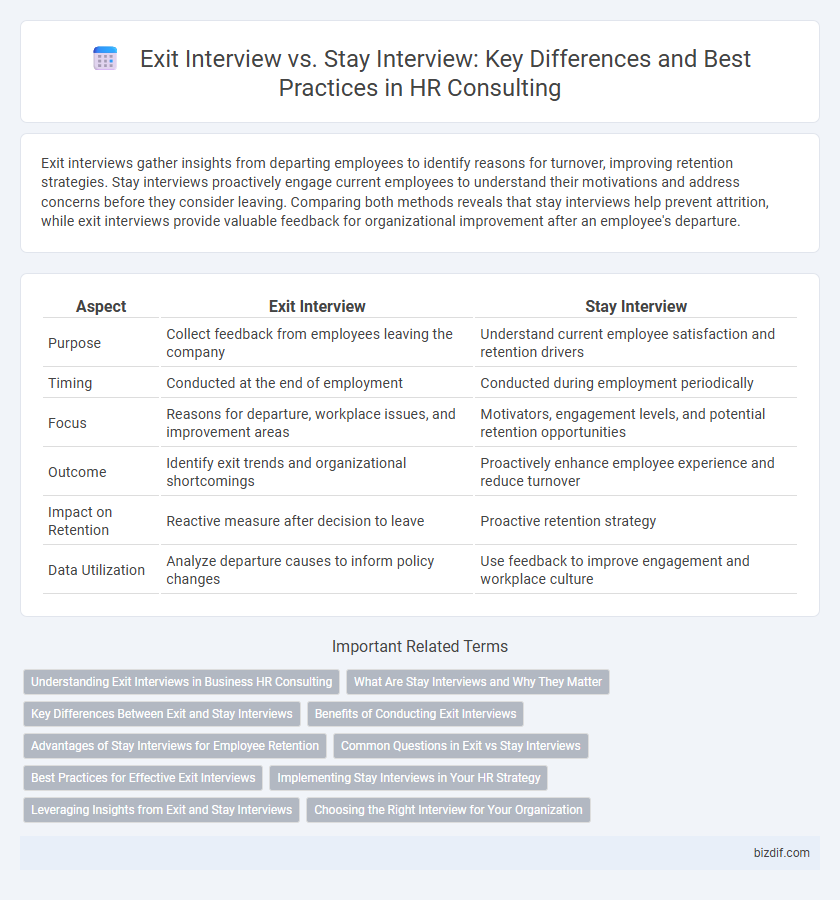Exit interviews gather insights from departing employees to identify reasons for turnover, improving retention strategies. Stay interviews proactively engage current employees to understand their motivations and address concerns before they consider leaving. Comparing both methods reveals that stay interviews help prevent attrition, while exit interviews provide valuable feedback for organizational improvement after an employee's departure.
Table of Comparison
| Aspect | Exit Interview | Stay Interview |
|---|---|---|
| Purpose | Collect feedback from employees leaving the company | Understand current employee satisfaction and retention drivers |
| Timing | Conducted at the end of employment | Conducted during employment periodically |
| Focus | Reasons for departure, workplace issues, and improvement areas | Motivators, engagement levels, and potential retention opportunities |
| Outcome | Identify exit trends and organizational shortcomings | Proactively enhance employee experience and reduce turnover |
| Impact on Retention | Reactive measure after decision to leave | Proactive retention strategy |
| Data Utilization | Analyze departure causes to inform policy changes | Use feedback to improve engagement and workplace culture |
Understanding Exit Interviews in Business HR Consulting
Exit interviews in business HR consulting provide critical insights into employee turnover by capturing candid feedback on workplace culture, management practices, and job satisfaction at the point of departure. These interviews enable organizations to identify recurring issues that contribute to employee attrition, supporting data-driven strategies to improve retention and enhance the employee experience. Collecting and analyzing exit interview data helps HR consultants recommend targeted interventions that reduce turnover costs and strengthen organizational performance.
What Are Stay Interviews and Why They Matter
Stay interviews are targeted discussions between managers and employees designed to uncover the reasons why employees remain with an organization and identify factors that contribute to job satisfaction. These interviews help HR teams address concerns proactively, improve retention strategies, and enhance workplace engagement by gathering direct feedback on employees' experiences and career goals. Stay interviews matter because they provide actionable insights that reduce turnover, foster a positive organizational culture, and support long-term talent management.
Key Differences Between Exit and Stay Interviews
Exit interviews occur when an employee is leaving an organization, aiming to gather insights on reasons for departure and areas for improvement, while stay interviews are proactive, conducted with current employees to understand job satisfaction and retention factors. Exit interviews often reveal issues that led to turnover, whereas stay interviews identify motivators that encourage employees to remain engaged and committed. Both types of interviews target employee experience but differ in timing, focus, and outcome utilization to enhance overall workforce management.
Benefits of Conducting Exit Interviews
Conducting exit interviews provides valuable insights into employee turnover by identifying patterns in workplace dissatisfaction and organizational challenges. These interviews help HR professionals develop targeted retention strategies by understanding reasons for departure directly from exiting employees. Analyzing exit interview data also supports improving onboarding processes, enhancing company culture, and reducing future recruitment costs.
Advantages of Stay Interviews for Employee Retention
Stay interviews provide proactive insights into employee satisfaction and engagement, enabling HR consultants to address concerns before turnover occurs. These interviews foster open communication channels, helping to identify career development opportunities and improve workplace culture. Consequently, stay interviews enhance employee retention by creating a more responsive and supportive organizational environment.
Common Questions in Exit vs Stay Interviews
Exit interviews commonly ask about reasons for leaving, job satisfaction, and feedback on management and work environment to identify areas for organizational improvement. Stay interviews focus on understanding employee motivation, what keeps them engaged, and suggestions for enhancing job satisfaction to improve retention. Both interview types gather critical insights but differ by exploring departure causes versus factors that encourage employees to remain.
Best Practices for Effective Exit Interviews
Effective exit interviews require structured questionnaires that focus on specific reasons for employee departure and insights into workplace improvements. Conducting interviews in a confidential, non-judgmental environment encourages honest feedback, which can help identify trends related to employee turnover. Incorporating standardized data analysis tools enables HR consultants to detect patterns and provide actionable recommendations to reduce future attrition.
Implementing Stay Interviews in Your HR Strategy
Implementing stay interviews in your HR strategy enhances employee retention by capturing real-time feedback on job satisfaction and workplace challenges, enabling proactive engagement before turnover risks arise. These interviews provide valuable insights into employee motivations and potential improvements, fostering a culture of continuous dialogue and trust. Integrating stay interviews complements exit interviews by addressing concerns early, reducing attrition rates and aligning HR initiatives with workforce needs.
Leveraging Insights from Exit and Stay Interviews
Leveraging insights from exit and stay interviews enables HR consulting firms to identify key factors influencing employee retention and turnover, optimizing workforce strategies. Exit interviews provide critical data on reasons for departure, while stay interviews uncover motivators that encourage employee engagement and loyalty. Combining both sets of insights allows organizations to tailor retention initiatives, improve organizational culture, and reduce costly attrition.
Choosing the Right Interview for Your Organization
Exit interviews gather valuable insights from departing employees to identify organizational weaknesses and improve retention strategies. Stay interviews proactively assess current employee satisfaction and engagement, helping to address concerns before turnover occurs. Selecting the right interview depends on your organization's goals; utilize exit interviews to understand turnover causes and stay interviews to enhance employee experience and reduce attrition.
Exit Interview vs Stay Interview Infographic

 bizdif.com
bizdif.com